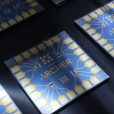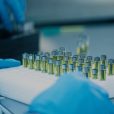CF33-hNIS-antiPDL1.
*moves mouse to x button to close tab*
“But wait!” your writer screams from the page, “I promise it’s interesting!”
Whilst I may not have the teaching prowess of Ms Frizzle, I implore you to stick around, because Imugene’s (ASX: IMU) immuno-oncology stuff is really interesting once you wrap your head around it.
The hideously long name CF33-hNIS-antiPDL1 is also known as CHECKvacc, just one of the novel anti-cancer immunotherapies being developed by Imugene. The therapy is a combination of multiple technologies:
- CF33 is a chimeric vaccinia (pox) virus. Viruses from this family were constituents of the smallpox vaccine, used to ‘infect’ cells with an inactive form of the virus to promote memory within the body’s own immune system. As well as being an ideal vehicle for gene therapies, the virus is highly cytolytic (toxic) for multiple tumor cell types making it a promising oncolytic (cancer cell killing) agent.
- hNIS is the Human Sodium-Iodide Symporter gene and allows for imaging to track the path of the virus.
- Anti PDL1 genes enable the virus to detect and fight cancer by triggering the body’s own immune system.
Mush all three of these together and you get Imugene’s CHECKvacc, a potentially revolutionary treatment for cancer patients that harnesses the body’s own immune system to trigger an antineoplastic response.
The therapy has been deemed safe in a number of preclinical trials which demonstrated both a local and systemic anti-tumor response.
Currently in Phase 1 trials, the Company has today announced the dosing of the first patient in cohort 3 of the trial. Currently being conducted at the City of Hope, a major cancer research and treatment centre in the United States.
The trials are focussed around triple negative breast cancer to evaluate the safety and efficacy of the drug in humans.
Triple negative breast cancer accounts for 20% of all breast cancer patients. It is an extremely aggressive subtype of breast cancer that portends a poor prognosis with a median survival of only 12 months post diagnosis. There is currently no targeted therapy for sufferers, and chemotherapy alone has proven ineffective at improving patient prognosis.
Novel therapies like CHECKvacc have huge potential to meet the serious unmet need for triple negative breast cancer patients. It has been demonstrated to detect and kill breast tumcour cells at lower doses than other therapies currently under clinical testing. Similar efficacy by CHECKvacc in killing cancer cells has been observed for pancreatic, stomach, lung, ovarian and brain cancer cells, with few side effects.
The Phase 1 trial will involve a dose escalation component, followed by an expansion to 12 patients at the final dose.
“We are pleased with the continued progress being made in this trial as we dose the first patient in cohort 3,” said Imugene MD and CEO, Leslie Chong. “From cohorts 1 and 2 we’ve continued to see early positive results in oncolytic virus infection and replication in the TNBC tumours and importantly there remains no observed toxicity. CHECKvacc has the potential to improve clinical response and survival in this indication where there are currently no meaningful treatments, and we are eager to deliver on that.”
Investors who took the time to read and digest it, have responded well to this news, with IMU shares soaring 7.41% higher than open at the time of writing.
The Company is well funded with $99.9 million in cash as at June 30, 2022, spending only $8.5 million last quarter on research and development.
- Parkinson’s UK backs Pharmaxis with $5 million to slow the onset of incurable disease with ‘ground breaking’ trial - September 1, 2022
- How this company is developing medtech to support Indigenous community health - August 22, 2022
- A round of ap-paws for PharmAust, changing the ruff prognosis for dogs with lymphoma - August 17, 2022













Leave a Comment
You must be logged in to post a comment.